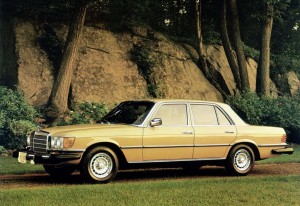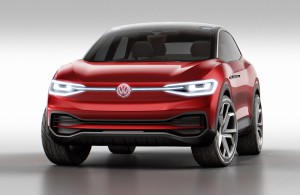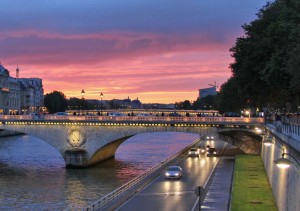
Mercedes diesels were wildly popular in the 1970s and '80s, and they are welcome in Hamburg, Germany.
While a number of European cities have been considering ways to limit diesel pollution, Hamburg, Germany, this week becomes the first city to ban some older diesel-powered vehicles.
The move, in part triggered by revelations that Volkswagen and other manufacturers have cheated on emissions tests, could soon be followed by other cities in Germany and other parts of Europe. Meanwhile, VW and a number of other automakers are taking steps that signal decreasing dependence on diesel power, a technology once favored across Europe because of its energy efficiency.
Hamburg’s initial move has disappointed some diesel critics, however, as it focuses only on some older, diesel-powered trucks traveling on two main sections of road in the northern German city. Some environmentalists contend the city is only moving pollution from one place to another by forcing those trucks to take alternative routes.
For years, diesels were the engines of choice for a majority of European motorists, and governments helped promote the technology with reduced fuel taxes and other incentives. And, as EU regulators started to focus on global warming gases like carbon dioxide, the Continent appeared to be moving even more in that direction due to the relatively high fuel efficiency of those engines.
(Bosch says it has secret to cleaning diesel emissions. Click Here for the story.)
But things began to shift as regulators started focusing on other emissions, including smog-causing oxides of nitrogen, as well as the ultra-fine particulates found in diesel soot that are linked to cancer and other diseases.
Then came the 2015 revelation that VW had intentionally used “defeat device” software to illegally pass diesel emissions tests. The automaker has since had to replace or repair an estimated 11 million vehicles, and it has paid out around $30 billion in fines, settlements and other costs.
VW has since begun shifting its product development efforts away from diesels, placing an emphasis on electrified powertrain technology. By mid-decade it expects to have more than 50 all-electric models on the road, some through the new Volkswagen I.D. sub-brand, along with scores of plug-in and conventional hybrids. Competitors such as BMW and Daimler AG are moving in a similar direction, the latter currently shifting its Smart city car brand to an all-electric strategy.
That still leaves tens of millions of diesel vehicles roaming European roadways, many of them using outdated pollution control technology. Environmentalists are demanding they either be cleaned up or, more likely, get taken off the road.
Earlier this year, a German court gave authorities permission to move ahead with bans on older diesel vehicles. A number of cities have laid out such proposals, including Stuttgart, where both Daimler and Porsche are based. But Hamburg this week became the first to actually move ahead.

VW plans to have two dozen fully electric vehicles, like this I.D. Crozz concept, in production, eliminating worries about a diesel ban.
(Click Here to see why Daimler remains committed to diesel use.)
It bars access by some older diesel-powered trucks to two busy stretches of main roadway within the city. However, that covers only about 1.4 miles of road. Those roadways were chosen because natural conditions mean vehicle pollution tends to concentrate, rather than dispersing.
“We are looking forward to opening the windows,” Friederike Barthel, a spokeswoman for the Allee Theater, told the New York Times. The facility, which hosts both a chamber opera and a children’s theater, is located along a stretch of the Max-Bramer-Allee that is covered by the diesel ban.
Not everyone is pleased, however. The automotive industry trade group, the VDA, had been pushing for other solutions and, in a statement, insisted that the problem with older diesels would have been resolved over time.
“The natural renewal of modern and clean diesel vehicles on its own will lead to a significant increase in air quality in the coming years,” it said.
Some environmentalists also criticized the limited nature of the ban, warning those trucks will simply find other routes and move pollution elsewhere.
But proponents contend Hamburg has just taken the first step and, by tracking the results, it will help other communities take similar steps, reducing diesel pollution across Germany.
(To see more about the German court ruling allowing a ban on diesel engines, Click Here.)
The ban is being watched by regulators in other cities and countries, as well. Paris, which has experienced record pollution problems in recent years, has been considering an outright diesel ban. And that could be just the beginning. Norway intends to start banning the sale of all vehicles using internal combustion engines by the middle of the coming decade, and Europe, France and even Germany have been considering similar restrictions.

